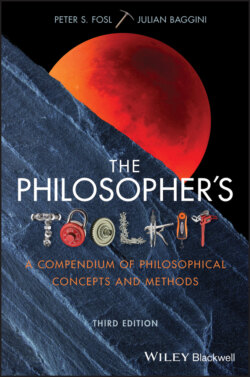Читать книгу The Philosopher's Toolkit - Julian Baggini, Julian Baggini - Страница 82
Objective and subjective probability
ОглавлениеWe can distinguish between objective and subjective probability. Objective probability is where what will happen is genuinely indeterminate. Radioactive decay could be one example. For any given atom of a radioactive material, the probability of it decaying over the period of its half‐life is 50–50. This means that, if you were to take ten such atoms, it is likely that five will decay over the period of the element’s half‐life, while five will not decay. On at least some interpretations in physics, it’s genuinely indeterminate which atoms will fall into which category.
Subjective probability, on the other hand, refers to cases where there may be no actual indeterminacy, but some particular mind or set of minds makes a probability judgement about the likelihood of some event. These subjects do so because they lack complete information about the causes that will determine the event. Their ignorance requires them to make a probabilistic assessment, usually by assigning a probability based on the number of occurrences of each outcome over a long sequence in the past.
So, for example, if we toss a coin, cover it, and ask you to bet on heads or tails, the outcome has already been determined. Since you don’t know what it is, you have to use your knowledge that heads and tails over the long run fall 50–50 to assign a 50 per cent probability that it’s a head and a 50 per cent probability that it’s a tail. If you could see the coin, there would be no 50–50 about it. You’d know the side that’s up with, in fact, 100 per cent certainty.
The odds set by gamblers and handicappers at horse races are also species of subjective probability. The posted odds record simply what the many people betting on the race subjectively believe about the outcome, not the real chance of any horse’s crossing the finish line first.
